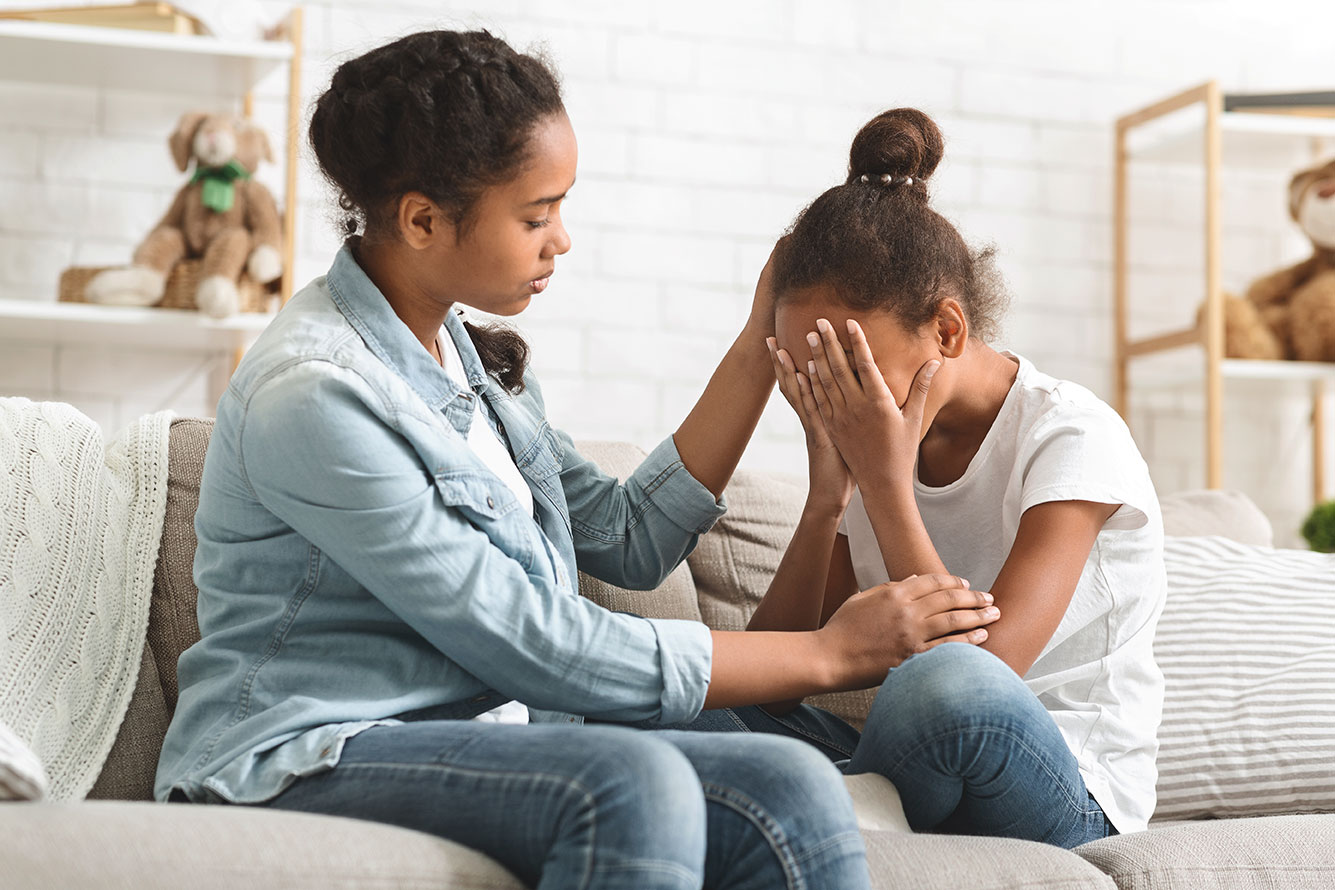Resources for Grieving Children
Click on the articles below to learn more about topics related to grieving children.

The Needs of Grieving Children
The grief of children can be painful to observe, often leaving adults feeling lost for ways to help. Alan Wolfelt, Ph.D., a noted expert in grief, discusses mourning needs for children who have suffered a significant loss. Recognizing and supporting these mourning needs can help children heal through their journey of grief.
The first mourning need is to accept the death.
It’s difficult for any child to accept that their loved one is gone and that their life will be forever changed. Children may try to imagine that the loss never really happened; this is OK and perfectly normal. Children are likely to revisit their loss at various points in their development due to changing and maturing cognitive and social skills. Eventually, with time and support from trusting adults in their life, children will learn to accept the reality and finality of difficult loss.
The second mourning need is to feel the sadness.
Children do not have to feel sad all the time because, quite frankly, it isn’t very much fun to feel sad. Children should be allowed and encouraged to have fun and feel good. Adults should be aware that children process difficult feelings differently than adults and what looks like “play” and fantasy may, in fact, be the means by which children express and cope with feelings of grief. Caring adults need to make themselves available to children when they do have their sad moments and give them permission to express their sadness.
The third mourning need is to remember the person who died.
Adults need to encourage children to talk about the person who died, share memories, and look at pictures.
The fourth mourning need has to do with helping children accept that their life is different now.
Loss changes children’s lives as well as their families. Children need to know that they are safe and will be cared for, despite the changes. While life will never be the same again, it is important children understand that doesn’t mean that they will never be happy again.
The fifth mourning need encourages children to think about “why” this loss happened.
This is a very difficult question to answer, especially for a child. Lacking information and life experience, children too often come to damaging “explanations” and conclusions based on misinformation and conjecture. Children should be encouraged to talk to a trusted adult about the “whys” in life.
The sixth mourning need involves allowing others to help the child who has suffered a loss; now and always!
It’s important for children to have adults in their lives that they can trust and who are always there for them — no matter what. The process of grief is hard work, which is why it’s important to assure the consistent availability of supportive people who can help during difficult times. Children should know that it is OK to ask for help.
“Grieving is a journey that teaches us how to love in a new way now that our loved one is no longer with us. Consciously remembering those who have died is the key that opens the hearts that allows us to love them in new ways.”
— Tom Attig, The Heart of Grief
Helping Grieving Children
Children and teens often feel alone and isolated with their grief. Many feel sorrow, sadness, anger, confusion and longing for their loved one while at the same time struggling to make the many necessary adjustments caused by the loss. Sometimes children and teens are hesitant to show their feelings to other family members because “I do not want to upset them or make them cry.” Caregiving adults, in the throes of their own grief, may find it difficult to know how to best support their children. Children, sensitive to the pain of their caregivers, may give the false appearance that they are relatively unaffected and may actively avoid acknowledging how deeply they are affected by their loss. Sensitivity about being viewed as “different” can prevent them from feeling comfortable in sharing their experience or expressing feelings with their friends.
Pathways of Hope offers a variety of services designed specifically to support grieving children and teens.
Individual grief counseling provides a safe environment where children can express their thoughts and feelings about the loss. Grief counseling sessions may include grief-related art therapy activities. Art activities provide a non-threatening, creative and enjoyable avenue that opens up expression of thoughts and feelings about the death and insights into how they are coping. One of the powerful qualities of art making is that it does not rely on words to communicate difficult feelings and experiences. This quality makes it especially healing for children and teens, many of whom may not have the vocabulary to express their feelings and experiences in words or are often uncomfortable talking about their grief. One does not need to be artistically gifted to benefit. Art activities can also provide a creative way to make objects that help maintain cherished memories as well as honor the life of their loved one. The completed project provides the parent(s) or guardian an object that is like a “window to the soul,’ facilitating better understanding of and support for their child.
Camps and mini-camps provide bereaved children and teens a fun-filled camp experience with other children and teens who have suffered similar losses. Bereavement camp experiences can help children learn new coping strategies and connect with other kids who have experienced loss. Opportunities range from Mini-Camp, day camp and overnight camp experiences. All offer traditional camp activities such as swimming, hiking, crafts and opportunities for grief support that are customized to kids. Mini-Camps are one-day programs that provide a mix of fun coupled with grief support for children and teens. Information is available by contacting your local Pathways of Hope services.
Healing pathways school-based programs bring grief support to the school setting. Partnering with area schools, Healing Pathways serves grieving children in their school community, providing grief support groups and other bereavement services to students impacted by loss. If you would like your child’s school to institute on-site grief support, please contact us and we will work with school administrators to explore the feasibility of Healing Pathways programming at your child’s school.

Bereavement Resources
Books for Children and Teens
Given the wide range and variable quality of books about grief and loss, choosing a book about grief can be a daunting task. The following is a list of books and internet resources that may provide a helpful starting place. Books may be found at your local library or can be purchased through local or on-line booksellers.
“Cinnamon Roll Sunday: A Child’s Story Of Anticipated Grief.” Jennifer L. Allen, LMFT., ATR-BC. Creating Space Independent Publishing Platform.
“Grieving for the Sibling You Lost: A Teen’s Guide to Coping With Grief and Finding Meaning After Loss.” Erica Goldblatt Hyatt, DSW, LCSW, MBE. Instant Help.
“I Have A Question About Death: Clear Answers For All Kids Including Children With Autism Spectrum Disorder Or Other Special Needs.” Jessica Kingsley Publishers.
“My Heart Hurts: A Grief Workshop for Children.” Karen Jaggers, LPC. My Heart Hurts.
“Tear Soup: A Recipe For Healing After Loss.” Pat Schwiebert, Chuck Deklyn, et al. Grief Watch.
“The Elephant In The Room: A Child’s Book For Grief And Loss.” Amanda Edwards, Leslie Ponciano, et al. Creating Space Independent Publishing Platform.
“The Good-Bye Book.” Todd Parr. Little Brown Books for Young Readers.
“Till We Meet Again.” Julie Muller. Illustrated by Camryn Cox. Julie Muller.
“What Does Dead Mean?” Caroline Jay and Jenni Thomas, OBE. Jessica Kingsley Publishers.
“What Happens When A Loved One Dies? Our First Talk About Death.” Jillian Roberts and Cindy Revell. Orca Book Publishers.
“When a Friend Dies: A Book for Teens About Grieving and Healing, Updated 3rd Edition.” Marilyn E. Gootman, EdD. Free Spirit Publishing.
“Where Are You? A Child’s Book About Loss.” Laura Olivieri. Lulu.com.
Internet Resources
www.dougy.org
www.nationalallianceforgrievingchildren.org
www.dailystrength.org
www.opentohope.com
www.whatsyourgrief.com
www.centerforloss.com
www.griefshare.org

